Chapter: Biotechnology Applying the Genetic Revolution: RNA-Based Technologies
Small Naturally Occurring Ribozymes
SMALL
NATURALLY OCCURRING RIBOZYMES
In contrast to the large
ribozymes, small ribozymes are only about 200 to 500 nucleotides long. Small
ribozymes include the hammerhead and hairpin ribozymes, the hepatitis delta
virus ribozyme, and the Varkud satellite ribozyme. These are often found in
viroids, virusoids, and satellite viruses, which are subviral agents. Viroids are self-replicating pathogens of plants
that are merely naked single strands of RNA with no protein coat. Satellite
viruses are small RNA molecules that require a helper virus for either
replication or capsid formation. Their genomes may encode proteins. Virusoids
are even less functional and are often considered a subtype of satellite virus.
Virusoids are single strands of circular RNA that encode no proteins. They rely
on helper viruses for both replication and a protein coat.
The hammerhead ribozyme is a small catalytic RNA that can catalyze a
self-cleavage reaction. Hammerhead ribozymes take part in the replication of
some viroids and satellite RNAs (Fig. 5.23). These both exist as
single-stranded RNA genomes that form rodlike structures that are resistant to
cellular ribonucleases. During viroid replication, the positive RNA strand is
replicated by the host cell RNA polymerase, resulting in a long concatemer of
negative-strand genomes. RNA polymerase then uses this as template to make a
positive strand. The long RNA is cut into individual unit genomes by the
hammerhead motif. Hammerhead ribozymes first cleave the ribose phosphate backbone
of RNA, and then ligate the linear unit genomes into circular genomes.
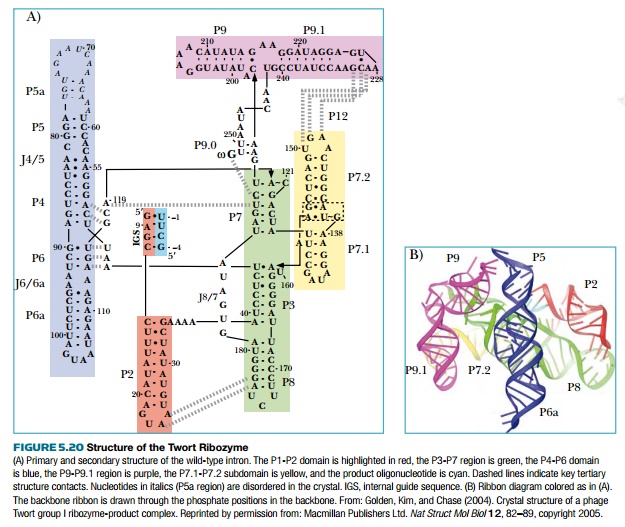
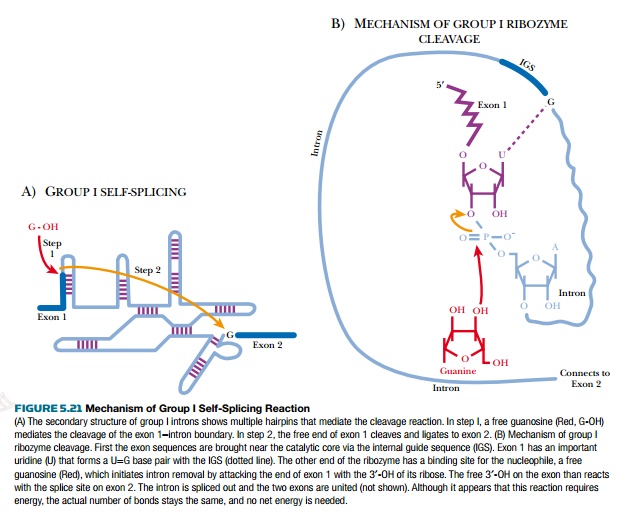
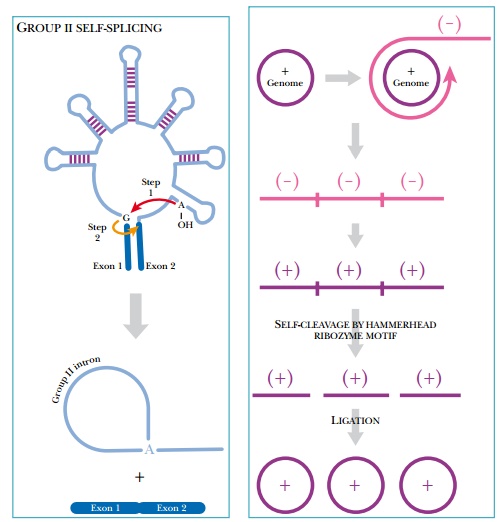
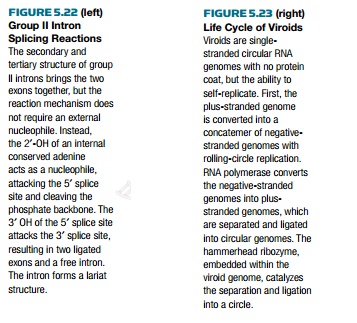
Another small ribozyme is the
hairpin ribozyme (Fig. 5.24). This is found in pathogenic plant satellite
viruses such as tobacco ring spot virus. The hairpin ribozyme from tobacco ring
spot virus was originally called the “paperclip” ribozyme, and this may be a
better description of the structure.
In vivo, hairpin ribozymes
cleave the linear concatemers of single-stranded RNA genomes, much like
hammerhead ribozymes, and then ligate the linear segments into circular
genomes.
Two other small ribozymes are
the Varkud satellite ribozyme from Neurospora and the hepatitis delta virus
(HDV) of humans. Both work by similar reaction mechanisms to initiate
self-cleavage and ligation reactions.
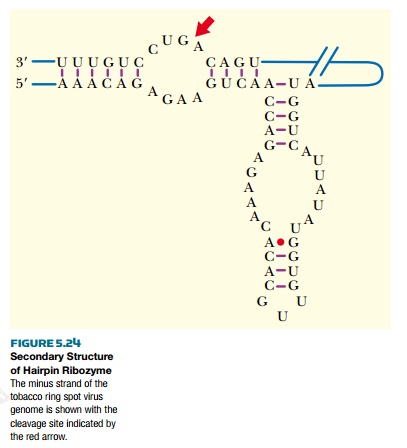
The Varkud satellite ribozyme
helps replicate the small Varkud plasmid found within the mitochondria of Neurospora. The hepatitis delta virus is a
viroid-like satellite virus of the hepatitis B virus.
Hepatitis B infects the liver
and can cause liver scarring, liver failure, and sometimes death.
In patients with hepatitis B,
the presence of HDV amplifies the symptoms, causing a very severe and often
fatal case of the disease. The satellite virus, HDV, has a single-stranded RNA
genome. It can be found in both positive and negative forms in liver cells.
Both the genomic and antigenomic sequences, as the positive and negative forms
are called, have regions that fold into an active ribozyme, which can catalyze
RNA cleavage and ligation. Unlike plant viroids, HDV also has an open reading
frame that encodes a protein called the delta antigen. Delta antigen plus coat
proteins from hepatitis B virus are required to package HDV into small
spherical particles. These can be spread from cell to cell, and from person to
person via bodily fluids such as saliva and semen.
Related Topics